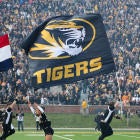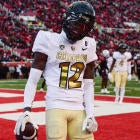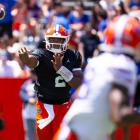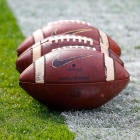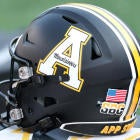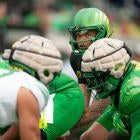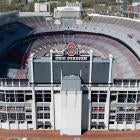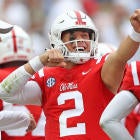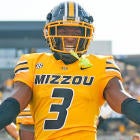OAKLAND, Calif. — The scene played out familiarly for college sports on Thursday: High-priced lawyers visiting the Bay Area arguing for or against college players being paid. Some of the names and issues had changed, but one constant remained: The judge.
U.S. District Judge Claudia Wilken, who presided over the Ed O’Bannon case, denied a motion by the NCAA and a group of 11 major conferences to dismiss consolidated scholarship lawsuits. The Shawne Alston and Martin Jenkins lawsuits argue in somewhat different ways that athletic scholarships are illegally capped below the actual cost of attending college.
The Alston plaintiffs seek an injunction against the NCAA’s compensation limits and class-action damages that could be worth hundreds of millions of dollars if they win. The Jenkins plaintiffs, led by prominent sports attorney Jeffrey Kessler, aren’t seeking damages and want an injunction that would allow a free market for players to be paid.
The cases will proceed into discovery and the class certification stage. Kessler will file a motion seeking class certification for the Jenkins plaintiffs within four weeks and plans to add more current players to the suit. Alston attorney Steve Berman suggested he needs four months of discovery.
Wilken noted there are a number of differences between the scholarship cases and her ruling in the O’Bannon case that the NCAA violated antitrust laws — a decision the NCAA is appealing. Among the differences she highlighted in Alston and Jenkins: damages claims that weren’t part of O’Bannon; a claim for players to be paid that isn't entirely tied to names, images and likenesses; and women’s basketball players aren’t part of the O’Bannon injunction.
Wilken’s decision in O’Bannon allowed a cap on athlete money -- no less than $5,000 per year in deferred pay and no less than the full cost of attendance while in school. For months, lawyers and college sports administrators have argued and wondered what exactly the ruling means, especially in relation to the new batch of cost-of-attendance lawsuits. In Wilken's mind, it clearly didn't mean the next legal threats against the NCAA are irrelevant.
NCAA attorney Jeffrey Mishkin argued that under the plaintiffs’ theory in Alston and Jenkins, the NCAA would still be in violation of antitrust law by complying with the O’Bannon injunction. “Your honor’s injunction, as we read it, was intended to eliminate the antitrust violation you found, not to perpetuate it,” Mishkin said.
Mishkin started his arguments with a caveat: “I have some trepidation making this argument because I’m addressing the author of the O’Bannon ruling.”
Replied Wilken: “Your argument could cut against you in the future.”
Wilken pressed Mishkin about why women’s basketball players should not have the right to sue given that they weren’t involved in the O’Bannon injunction.
“That’s an entirely implausible conclusion for you to reach,” Mishkin said.
“So should I enter an injunction into the women right now?” Wilken asked.
“I’m only addressing their complaint against us,” Mishkin replied.
Wilken ordered the parties into settlement talks, a fairly common procedure after a motion to dismiss gets denied.
“I think she’s sending us a sign,” said Berman, the lead attorney for the Alston plaintiffs. “Are you going to take care of the female athletes?”
Kessler suggested alternatives to paying players upfront could be incentives to graduate or money put into a trust fund. Kessler plans to add more current players to the Jenkins lawsuit, which is named after current Clemson football player Martin Jenkins.
"We think it’s important in our case to have players who will have current eligibility going up into the trial," Kessler said in an interview. "We think it’s the right move to make so we get the current input of players. They could be juniors or even younger."
While Kessler wants to expedite his case quickly, Berman asked for more time in part to gain discovery from the NCAA’s current autonomy process. The Power 5 conferences have the authority to create their own legislation to benefit athletes.
“What’s fascinating is right now the conferences are all promoting we want to pay full cost of attendance, we want to give them life insurance, we want to give them graduate school assistance,” Berman said. “They’re all competing, which is what we say should be happening. It should not be the case where the NCAA and its school members all sit around the room and decide what the kids get.”
Berman supports conferences competing against each other for cost-of-attendance stipends to players. “Eventually, if they think they’re paying too much money because fans are tuning out, the marketplace will regulate back down,” he said.
A parade of 17 lawyers filed into the courtroom Thursday on behalf of the NCAA, conferences and all of the plaintiffs. There were another eight lawyers on the phone. At one point, Wilken remarked that it would be a shame if the sides couldn’t agree on future scheduling Thursday given how much money all of the lawyers spent to be in Oakland.
Wilken’s denial of the motion to dismiss occurred right as news broke that Georgia running back Todd Gurley has been suspended indefinitely during an NCAA investigation. The investigation reportedly involves allegations Gurley accepted extra benefits for his likeness with a memorabilia broker.
In the O’Bannon ruling on Aug. 8, Wilken stopped short of allowing athletes to receive money for endorsements. “Allowing student-athletes to endorse commercial products would undermine the efforts of both the NCAA and its member schools to protect against the 'commercial exploitation' of student-athletes," Wilken wrote.
Said Berman: "We've never said there can't be any limits. ... We don't think we'd win in front of her, based on O'Bannon, if we argued the sky's the limits, pay them a million bucks."












